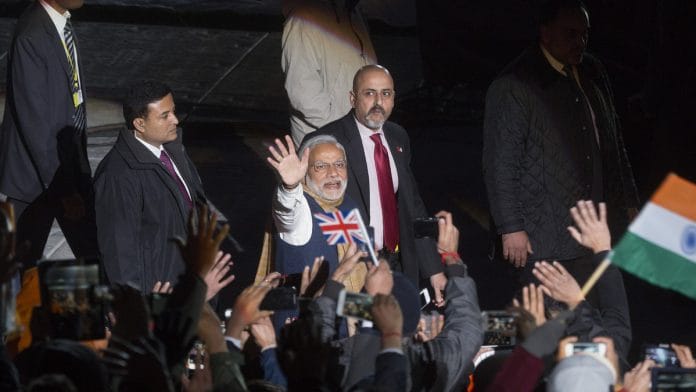New Delhi: The UK has been lagging behind other countries in engaging with India, a British Parliamentary inquiry report has found.
Over-reliance on historical ties and a failure to adjust to India’s growing influence and power on the global stage has led to “expensive missed opportunities”, the report stated.
ThePrint takes a look at two of the most important opportunities that have been missed by the UK.
Migration
The UK currently has two competing goals — reducing net migration to under one lakh per year and promoting its ‘Global Britain’ foreign policy strategy.
‘Global Britain’ seeks to expand trade with other nations and challenge the narrative of the UK’s economic and geopolitical decline post-Brexit. However, it has drawn criticism for lacking clear and concrete policy goals.
Britain’s failure to communicate on how India fits into this ‘Global Britain’ policy and restriction of visa access have led India to believe that it is in a ‘hostile environment’, according to the report.
Harsh visa restrictions were first introduced in 2011 by Theresa May when she was home secretary, with the aim of reducing the number of people overstaying their visas in the UK.
With students making up almost two-thirds of all visas issued to non-EU migrants at that time, May spearheaded stricter regulations on student visas. This included reducing the amount of time the students could stay in the UK for work after graduation from two years to four months.
As a result, the number of Indian students in the UK dropped from 39,090 in 2011-12 to 16,550 in 2016-17, with a slight increase to 19,750 in 2017-18.
Indian students were also hit harder than other nationalities. The report noted that a 2016 pilot scheme gave Chinese nationals access to a multiple-entry visa that was four times cheaper than the one available to Indian students.
A 2017 data showed that just 4,600 students overstayed their visas in 2016, in sharp contrast to government estimates of around one lakh. Further, the UK government still has not met its target of reducing net migration to under one lakh. Many have repeatedly called for reform in student visa regulations, as students do not appear to be affecting illegal migration numbers substantially.
Home secretary Sajid Javid had called for an end to the visa restrictions this month, and wanted to reinstate the two-year work period granted to foreign students after they finished their graduation.
Such demand has received cross-party support too, and the report also noted that there is “no excuse for the policies that have led the UK to lose ground in attracting Indian students and tourists”.
Trade
The UK has fallen from being India’s second-largest trade partner in 1998-99 to being 17th in 2018-19, as it began trading more with other Asian countries and the US. India now has a trade surplus of nearly $440 million with the UK.
The composition of both the countries’ imports and exports has also changed. In 1998, India’s top imports from the UK were gold (35 per cent), machinery parts (28 per cent) and chemical products (9 per cent). In 2017, they were machinery parts (29 per cent), metals (16 per cent) and precious metals (14 per cent).
Indian exports to the UK in 1998 were 36 per cent textiles, followed by 11 per cent vegetables. In 2017, Indian exports were 22 per cent textiles, 13 per cent machinery parts and 10 per cent chemical products. These reflect India’s growing medical and manufacturing sectors, and are areas where the UK should look to build its trade ties with India.
As the UK prepares to leave the European Union, it will seek non-EU trade partnerships. Increasing trade with India is high on the UK’s list of priorities, but India has made it clear that it is not eager to sign a trade deal without serious concessions for migration.
Further, without a clear indication as to how Indian businesses fit into the ‘Global Britain’ policy, it is difficult for India to open negotiations for a trade deal.
The British Parliamentary report also called for a “well-resourced government initiative” to improve communication of the UK’s policy goals as well as the appointment of a “champion” for UK-India ties.
UK startups and small businesses have also struggled to break into the Indian market, citing poor support from the government. The report has, therefore, also called for the establishment of a trade envoy with experience in the Indian business environment.
Also read: UK’s Conservative Party releases list of 10 probable PM contenders







The entire UK government is living in an echo chamber with no idea as to where the world is heading. This once courageous and immensely talented country that has given much to the world, and also reformed itself on many social dimensions, is today clueless, confused and divided on what’s best for the country. UK, along with the US currently think that they can control the forces of globalisation. Their tactical, ad-hoc Iran focused, Korea-focused etc etc approach to control the dynamics of a multi-polar world are unlikely to produce gains. China is already beyond their influence, and India is showing signs of keeping its national interest on top when dealing with these erstwhile superpowers. In times to come, both nations will be wringing their hands as the world moves on.
Early in her term, with Brexit on the anvil, PM May visited India. She felt India would be one of the vibrant trading nations with which Britain could forge a beneficial relationship. Seeing the actual trade figures for India gave her a reality check. The PM of Singapore too has expressed his disappointment. Indian diplomacy will have to be supported by much better economic performance at home.